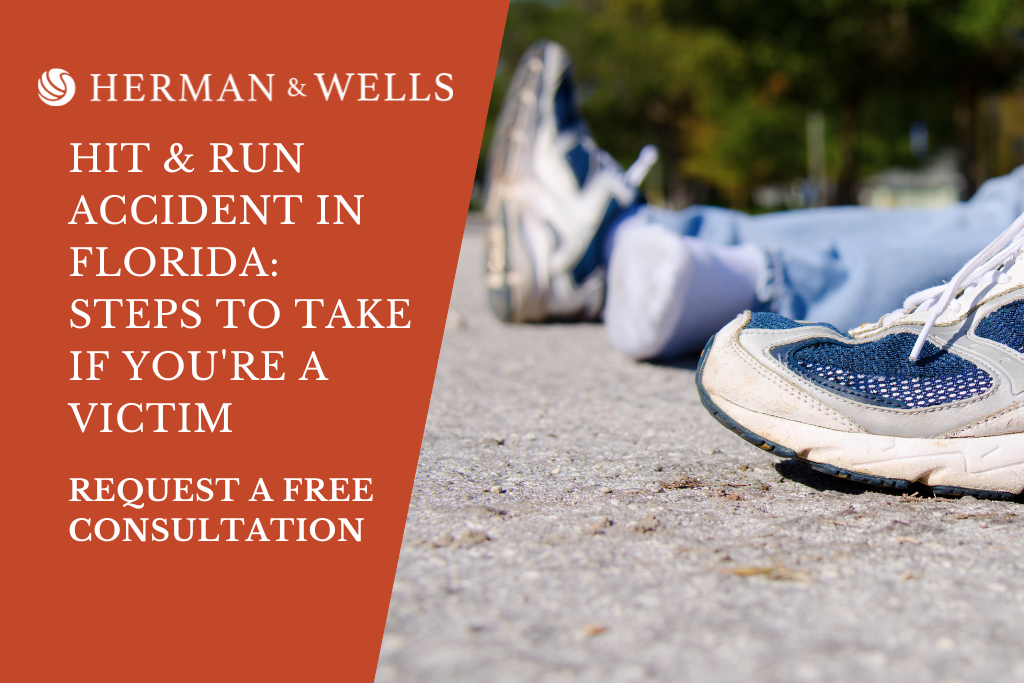The state of Florida has recently enacted a new statute of limitations for personal injury cases. This important law affects anyone who may have been injured due to someone else’s negligence or intentional misconduct and seeks compensation through civil litigation. In this article, we provide an overview of the new personal injury statute of limitations in Florida as of 2023 and discuss why it is so important for personal injury victims to understand and act within the legal time limits.
If you have been injured in an accident and are considering pursuing legal action, the new personal injury statute of limitations in Florida is something you should be aware of. It is important to act sooner rather than later in order to protect your rights and maximize your chances for a successful recovery.
Taking prompt action can be critical for your case. Don’t wait – contact the personal injury lawyers of Herman & Wells today!

The Cliff Notes: Key Takeaways From This Post
- 1Florida recently enacted a revised statute of limitations for personal injury cases, reducing the time from four to two years from the date of the incident.
- 2This new law has potentially far-reaching negative impacts on Floridian victims by limiting their time for discovery/investigation and leaving them at risk of premature settlements.
- 3It is critical for Florida personal injury claimants to understand their rights and promptly seek legal representation and advice to protect their interests.
- 4Contact Herman & Wells, a top personal injury law firm in Florida, if you have an injury claim – we will provide the legal guidance you need and ensure your rights are protected.
Understanding Statutes Of Limitations In Florida
A statute of limitations is a law that sets forth the time period within which an individual must file a claim for personal injury compensation. The intention is to incentivize potential plaintiffs to pursue their claims in a timely manner while protecting defendants from being exposed indefinitely to liability.
In Florida, lawsuits for personal injury are subject to a two-year statute of limitations. This is significantly shorter than many other states, including California and Texas, which have statutes of four years for general negligence cases. Similarly, the District of Columbia has a three year limit on personal injury suits.
The New Personal Injury Statute Of Limitations In Florida
In March 2023, Governor Ron DeSantis signed House Bill (HB) 837 into law, significantly impacting the statute of limitations in Florida. Under this new law, any personal injury cases brought forward must do so within two years from the date of the incident or they will be barred permanently. This has caused a considerable reduction to the statute of limitations in the state, as it used to be four years.

Negative Effects Of The Updated Statute Of Limitations For Floridians
An attorney can help by first investigating the accident to determine what happened and who was at fault. This involves reviewing police reports, medical records, witness statements, photographs, and other evidence related to the accident. In some cases, it may even be necessary to visit the scene of the accident or interview parties involved in order to gain more insight into how the incident occurred.
Navigating Florida’s Insurance System And Laws
The new statute of limitations is highly restrictive and limits the rights of victims:
Limited Time For Discovery And Investigation
The shorter statute of limitations means that victims have less time to determine the full extent of their injuries/damages, collect evidence and investigate the conduct of the negligent party. This could mean that some injured individuals may be unable to file a lawsuit within this new time frame, impeding their pursuit of justice and compensation.
Restricted Opportunity To Secure Legal Representation
The new law disproportionately affects those who are less fortunate, as they may not have access to legal representation and knowledge of their rights. This could prevent them from filing a claim within the allotted time frame and consequently, deny them any financial compensation.
Inadequate Time For Recovery
The new statute of limitations requires individuals to act quickly and file a claim for compensation before they have even recovered from their injuries and assessed the full extent of damages sustained. This poses an additional burden on those who are already vulnerable and struggling with physical and emotional trauma, as they may not be in a position to make informed decisions or take action within a short period of time. As a result, this law could result in some deserving individuals feeling rushed and being unable to present a solid case.
Increased Risk Of Premature Settlements
With the shortened statute of limitations, Florida claimants could be tempted to accept quick, lower settlements than they are entitled to. This means insufficient funds to cover injuries, pain, and suffering which could cause long-term financial strain.
Strain On The Florida Legal System
While the new statute may reduce the number of pending cases, this comes at the cost of encouraging plaintiffs to hastily file claims before the new deadline. This could exert tremendous pressure on the legal system, ultimately compromising the efficiency of court proceedings. Preparations must be made to ensure that the court system can handle the expected surge in claims without compromising the overall integrity of the legal system.
Important Considerations For Florida Personal Injury Claimants
The recent revision to Florida’s statute of limitations for negligence claims emphasizes the significance of understanding the legal time constraints associated with filing personal injury lawsuits. This modification, with its potential drawbacks discussed earlier, can particularly put Floridian claimants at a disadvantage. If you have suffered an injury in Florida, it is vital to promptly seek the guidance of an experienced personal injury attorney to safeguard your rights and meet the relevant deadlines.
Why You Should Consult With A Personal Injury Attorney In Florida ASAP
It is crucial to understand the significance of recent changes to the statute of limitations in Florida’s insurance laws and the reasons why you should consult a personal injury lawyer as soon as possible. Here are key factors to consider:
Preservation Of Evidence
Acting promptly allows for the preservation of critical evidence related to your personal injury case. Evidence such as accident reports, medical records, photographs, and witness statements can significantly impact the strength of your claim. By consulting a personal injury lawyer early on, they can guide you on how to gather and preserve crucial evidence that may be necessary for your case.
Evaluation Of Legal Options
Personal injury lawyers have the expertise to evaluate the merits of your case and determine the legal options available to you under the recent changes. They can assess the extent of your injuries, the liability of the responsible party, and the potential damages you may be entitled to. Consulting a lawyer promptly allows for a thorough assessment of your case and an understanding of the legal remedies available to pursue compensation.
Legal Complexities
Personal injury cases can be legally complex, involving intricate rules, regulations, and legal precedents. By consulting a personal injury lawyer without delay, you can benefit from their knowledge and experience in navigating the legal intricacies of your unique case. They can guide you through the legal process, explain your rights, and help you make informed decisions.
Time is of the essence when it comes to personal injury cases, especially considering recent changes to the statute of limitations. By consulting a personal injury lawyer as soon as possible, you can ensure that your rights are protected, receive appropriate legal advice, and increase your chances of obtaining fair compensation for your injuries. Even if you decide not to hire an attorney, it is worth considering speaking to one in order to get a better understanding of your options.
Have An Injury Claim? Contact Herman & Wells
In conclusion, the new statute of limitations in Florida has changed the way personal injury claimants can seek justice and compensation. This law could pose setbacks for those seeking to file a claim and it is important to stay informed to make sure your rights are protected.
If you have been injured due to the negligence of another party, please contact an experienced personal injury attorney in Florida right away. While our law firm’s headquarters is located in Pinellas Park, we have attorneys in St. Petersburg, Tampa, Clearwater, Seminole, Lakewood Ranch, Bradenton, and Sarasota.
Our personal injury lawyers at Herman & Wells are available to discuss your case and provide you with the legal guidance you need. Get started on filing your claim today and seek justice for your injuries! Call (727) 821-3195 for a free consultation today!





